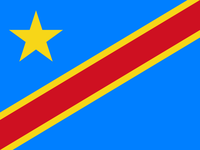Congo, Democratic Republic of the
The Democratic Republic of the Congo (DRC) became independent of Belgium on 30 June 1960. A 1965 military coup lead to 32 years of the country as 'Zaire' under Mobutu Sese Seko. In 1997 a succesful rebellion under Laurent Kabila saw the name of the country changed, but conflict continued. Laurent Kabila was assassinated in January 2001 and his son, Joseph Kabila became head of state. In 2002 fighting ended with the signing of the Pretoria Accord among all warring parties. A constitutional referendum was held in 2005 and elections in 2006.
In 2009, following conflict in eastern DRC, the government signed a peace agreement with the National Congress for the Defense of the People (CNDP), a rebel group. An attempt to integrate CNDP members into the Congolese military failed, and they defected in 2012, forming the M23 armed group (named after the 23 March 2009 peace agreements). Renewed conflict has lead to the displacement of large numbers of persons and significant human rights abuses. As of February 2013, peace talks between the Congolese government and M23 were on-going. In addition, the DRC continues to experience violence committed by other armed groups including the Democratic Forces for the Liberation of Rwanda and Mai Mai groups.
In the most recent national elections, held in November 2011, Joseph Kabila was re-elected to the presidency, despite the results being disputed.
The Democratic Republic of the Congo has a civil legal system based on a Belgian version of French civil law.
The Democratic Republic of Congo has a constitution dating from 1996 which has provisions providing that individual liberty is the rule, detention the exception; that no one may be subject to cruel, inhumane or degrading treatment; and that all persons have the right to have their case heard by a competent judge within a reasonable time.
A comprehensive listing of the laws of Democratic Republic of Congo is not available online.

